Abstract
Despite the urgent need of a new antimalarial drugs, particularly those against multiresistant falciparum malaria, only a limited number of drugs are now at an advanced stage of preclinical or clinical development. They include artemisinin derivatives, pyronaridine and benflumetol (all originally developed in China), as well as new antifolate combinations, the hydroxynaphoquinone atovaquone which has a novel mode of action, and a new 8-aminoquinoline which appears more active and less toxic than primaquine. Some of these drugs may become available in the next few years. It is therefore essential to find mechanisms to ensure that they are made available at an affordable price to the populations that really need them.
Full text
PDF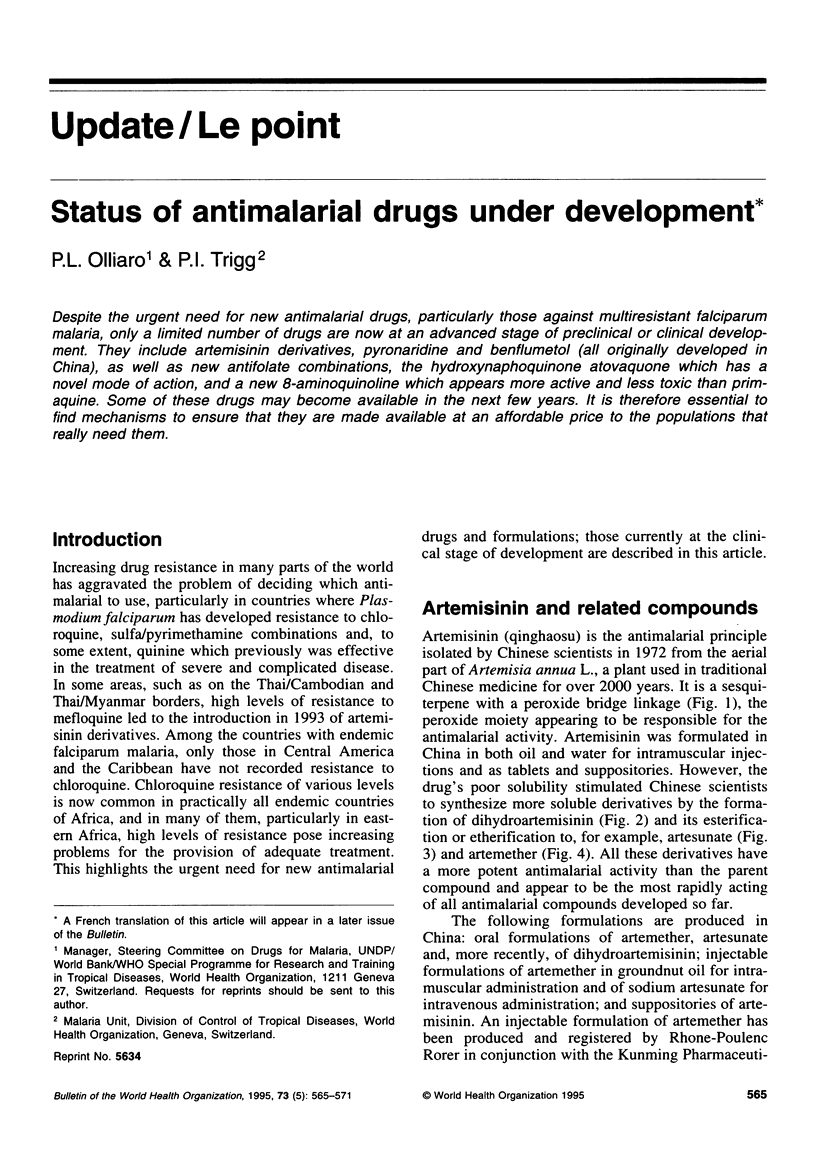
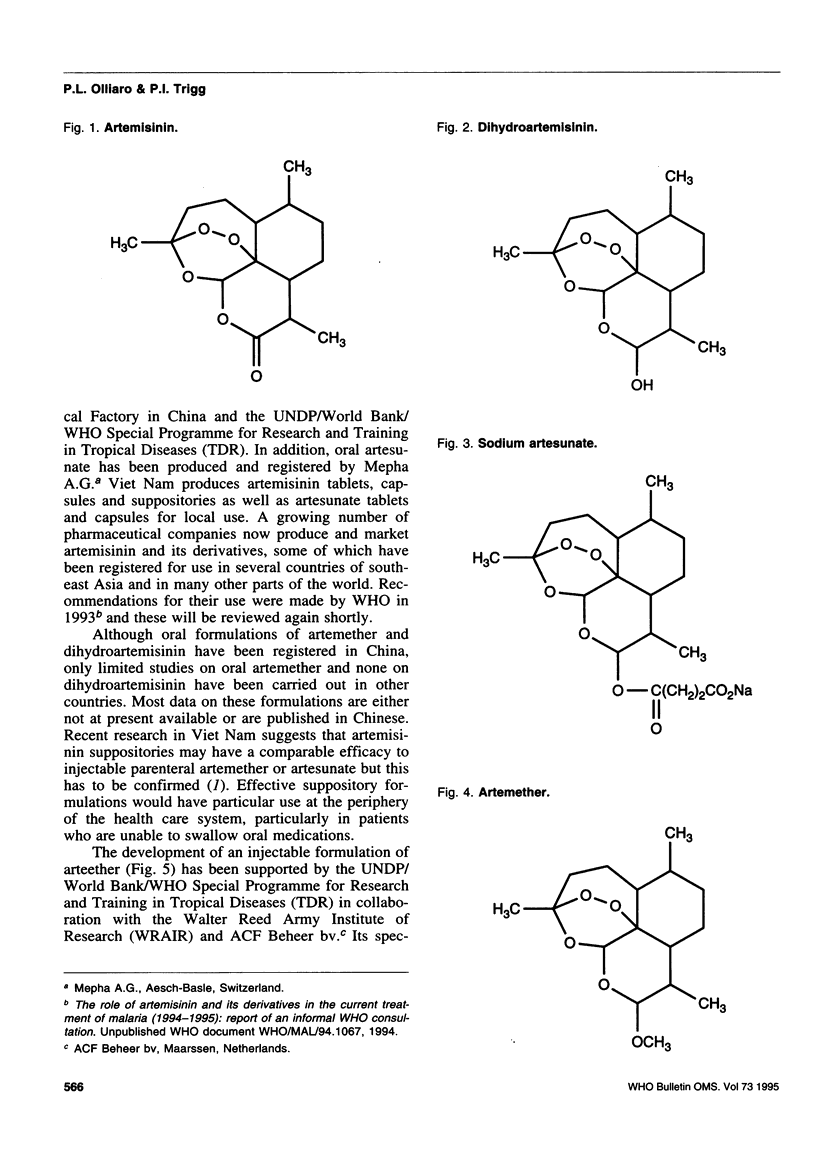
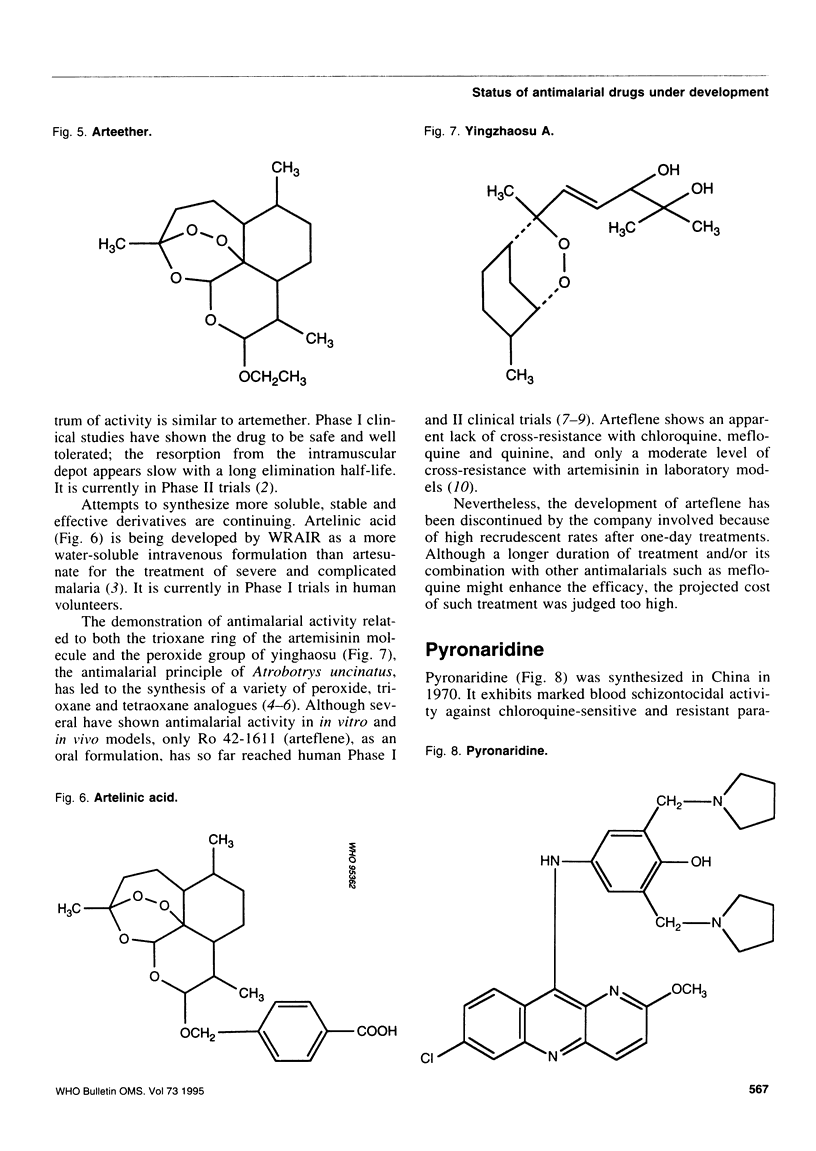
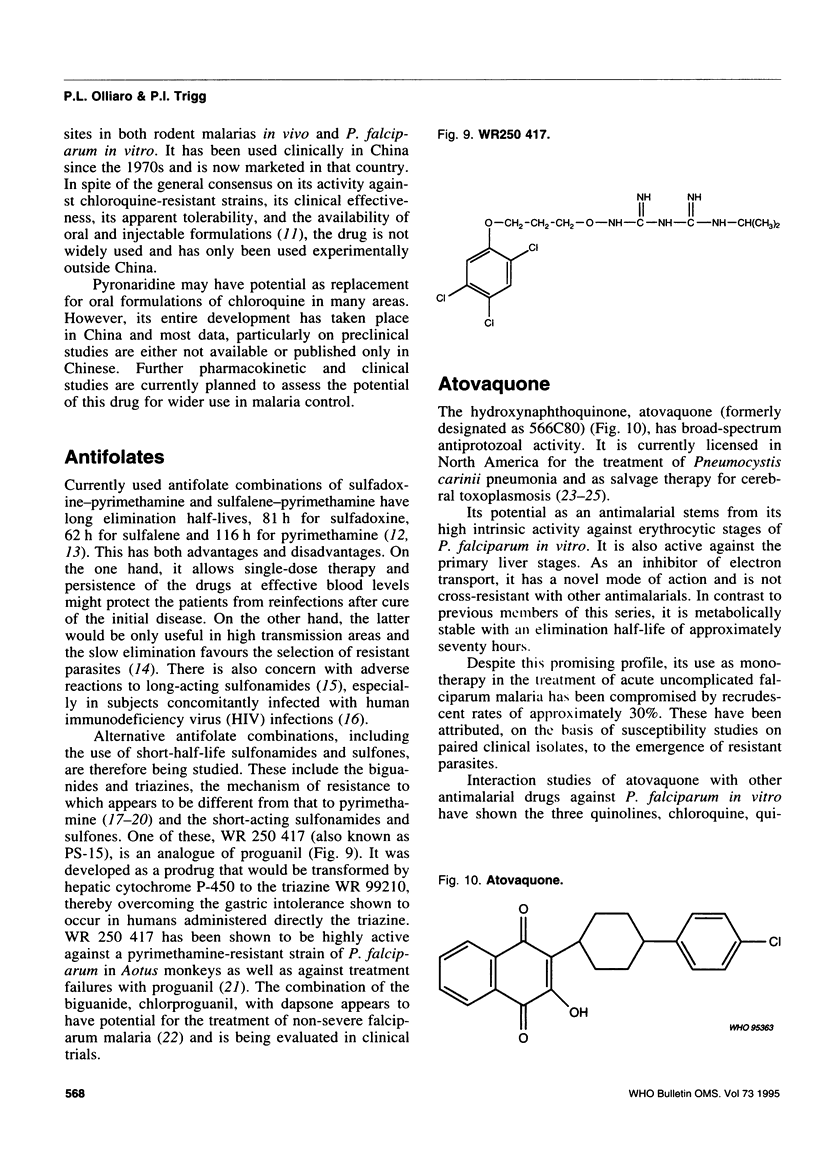
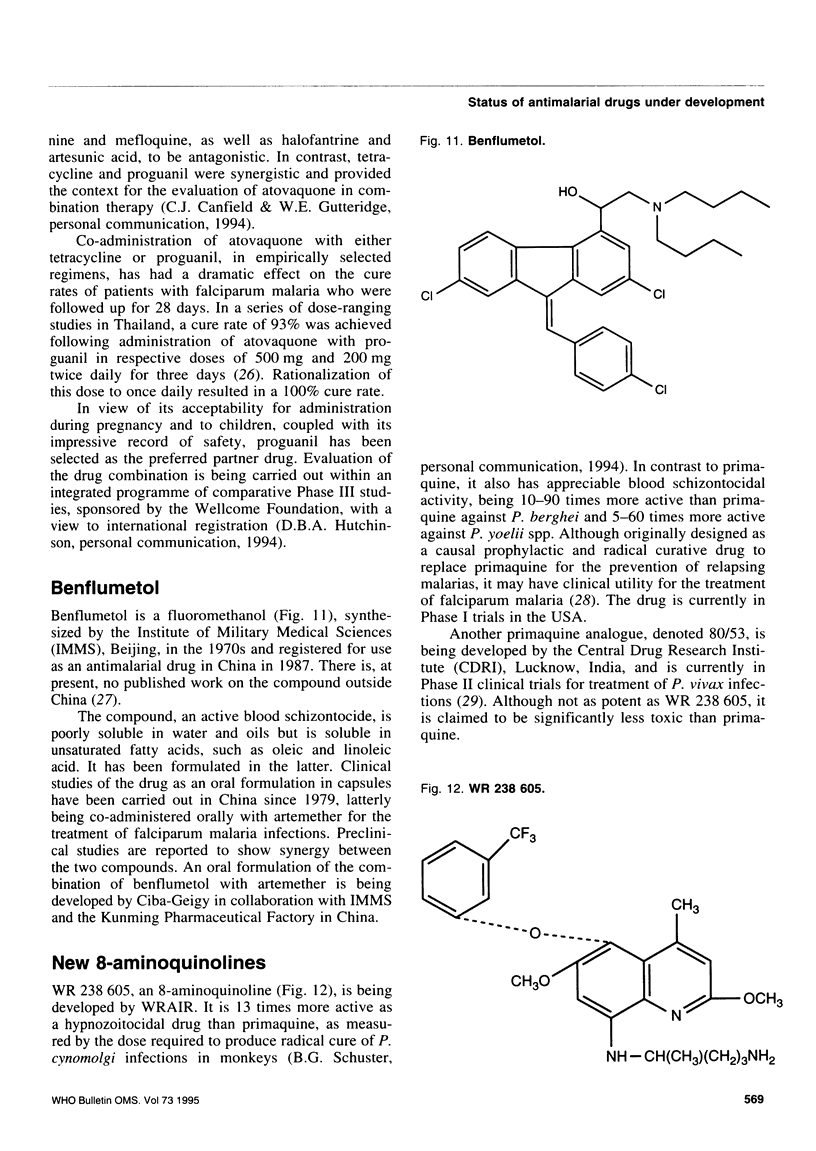
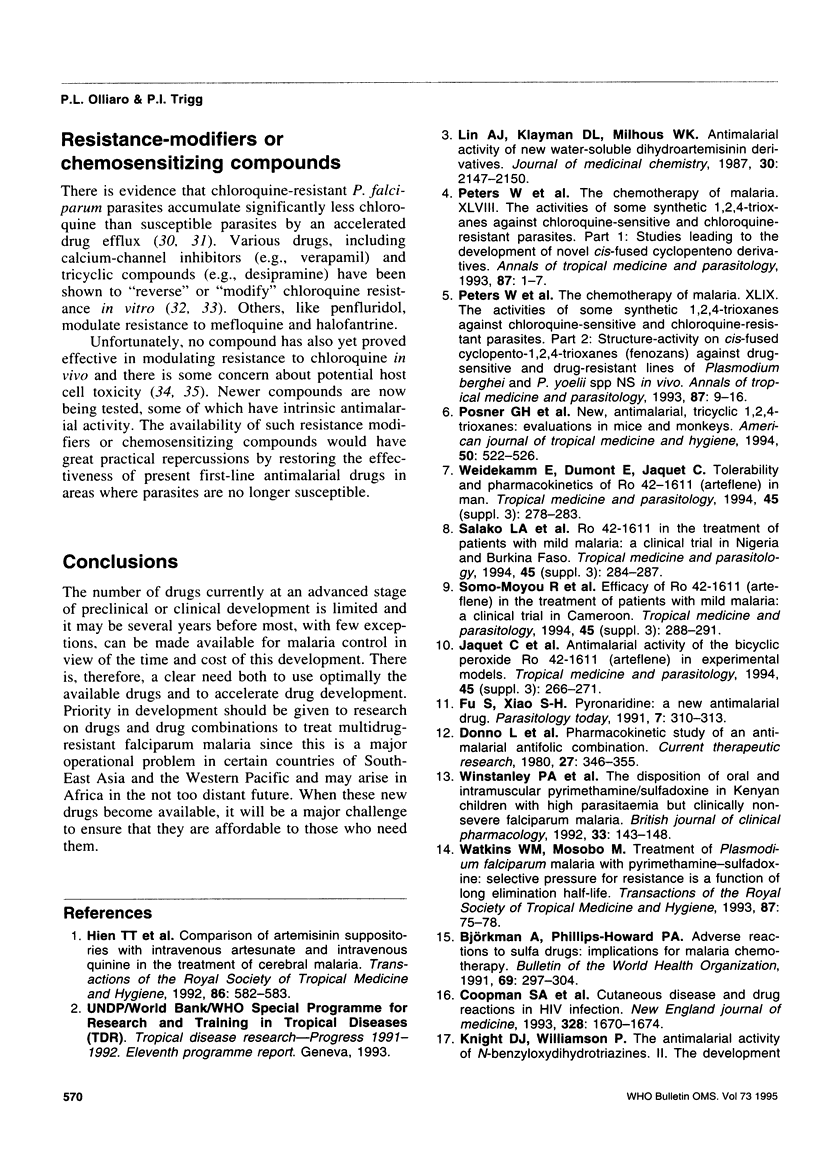
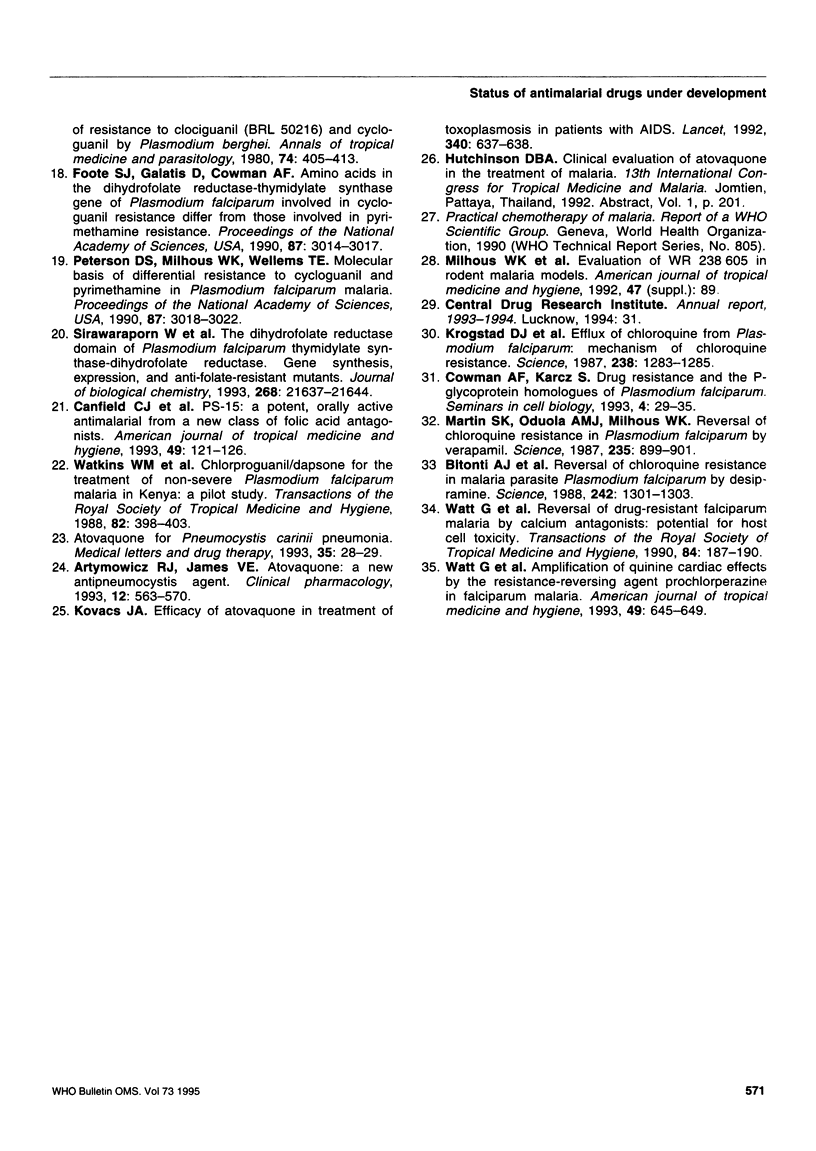
Selected References
These references are in PubMed. This may not be the complete list of references from this article.
- Artymowicz R. J., James V. E. Atovaquone: a new antipneumocystis agent. Clin Pharm. 1993 Aug;12(8):563–570. [PubMed] [Google Scholar]
- Bitonti A. J., Sjoerdsma A., McCann P. P., Kyle D. E., Oduola A. M., Rossan R. N., Milhous W. K., Davidson D. E., Jr Reversal of chloroquine resistance in malaria parasite Plasmodium falciparum by desipramine. Science. 1988 Dec 2;242(4883):1301–1303. doi: 10.1126/science.3057629. [DOI] [PubMed] [Google Scholar]
- Björkman A., Phillips-Howard P. A. Adverse reactions to sulfa drugs: implications for malaria chemotherapy. Bull World Health Organ. 1991;69(3):297–304. [PMC free article] [PubMed] [Google Scholar]
- Canfield C. J., Milhous W. K., Ager A. L., Rossan R. N., Sweeney T. R., Lewis N. J., Jacobus D. P. PS-15: a potent, orally active antimalarial from a new class of folic acid antagonists. Am J Trop Med Hyg. 1993 Jul;49(1):121–126. doi: 10.4269/ajtmh.1993.49.121. [DOI] [PubMed] [Google Scholar]
- Cowman A. F., Karcz S. Drug resistance and the P-glycoprotein homologues of Plasmodium falciparum. Semin Cell Biol. 1993 Feb;4(1):29–35. doi: 10.1006/scel.1993.1004. [DOI] [PubMed] [Google Scholar]
- Foote S. J., Galatis D., Cowman A. F. Amino acids in the dihydrofolate reductase-thymidylate synthase gene of Plasmodium falciparum involved in cycloguanil resistance differ from those involved in pyrimethamine resistance. Proc Natl Acad Sci U S A. 1990 Apr;87(8):3014–3017. doi: 10.1073/pnas.87.8.3014. [DOI] [PMC free article] [PubMed] [Google Scholar]
- Fu S., Xiao S. H. Pyronaridine: A new antimalarial drug. Parasitol Today. 1991 Nov;7(11):310–313. doi: 10.1016/0169-4758(91)90267-r. [DOI] [PubMed] [Google Scholar]
- Hien T. T., Arnold K., Vinh H., Cuong B. M., Phu N. H., Chau T. T., Hoa N. T., Chuong L. V., Mai N. T., Vinh N. N. Comparison of artemisinin suppositories with intravenous artesunate and intravenous quinine in the treatment of cerebral malaria. Trans R Soc Trop Med Hyg. 1992 Nov-Dec;86(6):582–583. doi: 10.1016/0035-9203(92)90137-2. [DOI] [PubMed] [Google Scholar]
- Jaquet C., Stohler H. R., Chollet J., Peters W. Antimalarial activity of the bicyclic peroxide Ro 42-1611 (arteflene) in experimental models. Trop Med Parasitol. 1994 Sep;45(3):266–271. [PubMed] [Google Scholar]
- Kovacs J. A. Efficacy of atovaquone in treatment of toxoplasmosis in patients with AIDS. The NIAID-Clinical Center Intramural AIDS Program. Lancet. 1992 Sep 12;340(8820):637–638. doi: 10.1016/0140-6736(92)92172-c. [DOI] [PubMed] [Google Scholar]
- Krogstad D. J., Gluzman I. Y., Kyle D. E., Oduola A. M., Martin S. K., Milhous W. K., Schlesinger P. H. Efflux of chloroquine from Plasmodium falciparum: mechanism of chloroquine resistance. Science. 1987 Nov 27;238(4831):1283–1285. doi: 10.1126/science.3317830. [DOI] [PubMed] [Google Scholar]
- Lin A. J., Klayman D. L., Milhous W. K. Antimalarial activity of new water-soluble dihydroartemisinin derivatives. J Med Chem. 1987 Nov;30(11):2147–2150. doi: 10.1021/jm00394a037. [DOI] [PubMed] [Google Scholar]
- Martin S. K., Oduola A. M., Milhous W. K. Reversal of chloroquine resistance in Plasmodium falciparum by verapamil. Science. 1987 Feb 20;235(4791):899–901. doi: 10.1126/science.3544220. [DOI] [PubMed] [Google Scholar]
- Peters W., Robinson B. L., Rossier J. C., Misra D., Jefford C. W., Rossiter J. C. The chemotherapy of rodent malaria. XLIX. The activities of some synthetic 1,2,4-trioxanes against chloroquine-sensitive and chloroquine-resistant parasites. Part 2: Structure-activity studies on cis-fused cyclopenteno-1,2,4-trioxanes (fenozans) against drug-sensitive and drug-resistant lines of Plasmodium berghei and P. yoelii ssp. NS in vivo. Ann Trop Med Parasitol. 1993 Feb;87(1):9–16. doi: 10.1080/00034983.1993.11812734. [DOI] [PubMed] [Google Scholar]
- Peterson D. S., Milhous W. K., Wellems T. E. Molecular basis of differential resistance to cycloguanil and pyrimethamine in Plasmodium falciparum malaria. Proc Natl Acad Sci U S A. 1990 Apr;87(8):3018–3022. doi: 10.1073/pnas.87.8.3018. [DOI] [PMC free article] [PubMed] [Google Scholar]
- Posner G. H., Oh C. H., Webster H. K., Ager A. L., Jr, Rossan R. N. New, antimalarial, tricyclic 1,2,4-trioxanes: evaluations in mice and monkeys. Am J Trop Med Hyg. 1994 Apr;50(4):522–526. doi: 10.4269/ajtmh.1994.50.522. [DOI] [PubMed] [Google Scholar]
- Salako L. A., Guiguemde R., Mittelholzer M. L., Haller L., Sorenson F., Stürchler D. Ro 42-1611 in the treatment of patients with mild malaria: a clinical trial in Nigeria and Burkina Faso. Trop Med Parasitol. 1994 Sep;45(3):284–287. [PubMed] [Google Scholar]
- Sirawaraporn W., Prapunwattana P., Sirawaraporn R., Yuthavong Y., Santi D. V. The dihydrofolate reductase domain of Plasmodium falciparum thymidylate synthase-dihydrofolate reductase. Gene synthesis, expression, and anti-folate-resistant mutants. J Biol Chem. 1993 Oct 15;268(29):21637–21644. [PubMed] [Google Scholar]
- Somo-Moyou R., Mittelholzer M. L., Sorenson F., Haller L., Stürchler D. Efficacy of Ro 42-1611 (arteflene) in the treatment of patients with mild malaria: a clinical trial in Cameroon. Trop Med Parasitol. 1994 Sep;45(3):288–291. [PubMed] [Google Scholar]
- Watkins W. M., Brandling-Bennett A. D., Nevill C. G., Carter J. Y., Boriga D. A., Howells R. E., Koech D. K. Chlorproguanil/dapsone for the treatment of non-severe Plasmodium falciparum malaria in Kenya: a pilot study. Trans R Soc Trop Med Hyg. 1988;82(3):398–403. doi: 10.1016/0035-9203(88)90133-2. [DOI] [PubMed] [Google Scholar]
- Watkins W. M., Mosobo M. Treatment of Plasmodium falciparum malaria with pyrimethamine-sulfadoxine: selective pressure for resistance is a function of long elimination half-life. Trans R Soc Trop Med Hyg. 1993 Jan-Feb;87(1):75–78. doi: 10.1016/0035-9203(93)90431-o. [DOI] [PubMed] [Google Scholar]
- Watt G., Long G. W., Grogl M., Martin S. K. Reversal of drug-resistant falciparum malaria by calcium antagonists: potential for host cell toxicity. Trans R Soc Trop Med Hyg. 1990 Mar-Apr;84(2):187–190. doi: 10.1016/0035-9203(90)90248-d. [DOI] [PubMed] [Google Scholar]
- Watt G., Na-Nakorn A., Bateman D. N., Plubha N., Mothanaprakoon P., Edstein M., Webster H. K. Amplification of quinine cardiac effects by the resistance-reversing agent prochlorperazine in falciparum malaria. Am J Trop Med Hyg. 1993 Nov;49(5):645–649. doi: 10.4269/ajtmh.1993.49.645. [DOI] [PubMed] [Google Scholar]
- Weidekamm E., Dumont E., Jaquet C. Tolerability and pharmacokinetics of Ro 42-1611 (arteflene) in man. Trop Med Parasitol. 1994 Sep;45(3):278–283. [PubMed] [Google Scholar]
- Winstanley P. A., Watkins W. M., Newton C. R., Nevill C., Mberu E., Warn P. A., Waruiru C. M., Mwangi I. N., Warrell D. A., Marsh K. The disposition of oral and intramuscular pyrimethamine/sulphadoxine in Kenyan children with high parasitaemia but clinically non-severe falciparum malaria. Br J Clin Pharmacol. 1992 Feb;33(2):143–148. doi: 10.1111/j.1365-2125.1992.tb04016.x. [DOI] [PMC free article] [PubMed] [Google Scholar]


